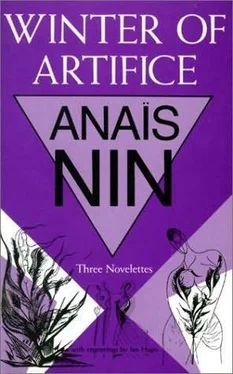Anaïs Nin - The Winter of Artifice
Здесь есть возможность читать онлайн «Anaïs Nin - The Winter of Artifice» весь текст электронной книги совершенно бесплатно (целиком полную версию без сокращений). В некоторых случаях можно слушать аудио, скачать через торрент в формате fb2 и присутствует краткое содержание. Год выпуска: 2007, Издательство: Sky Blue Press, Жанр: Классическая проза, на английском языке. Описание произведения, (предисловие) а так же отзывы посетителей доступны на портале библиотеки ЛибКат.
- Название:The Winter of Artifice
- Автор:
- Издательство:Sky Blue Press
- Жанр:
- Год:2007
- ISBN:нет данных
- Рейтинг книги:4 / 5. Голосов: 1
-
Избранное:Добавить в избранное
- Отзывы:
-
Ваша оценка:
- 80
- 1
- 2
- 3
- 4
- 5
The Winter of Artifice: краткое содержание, описание и аннотация
Предлагаем к чтению аннотацию, описание, краткое содержание или предисловие (зависит от того, что написал сам автор книги «The Winter of Artifice»). Если вы не нашли необходимую информацию о книге — напишите в комментариях, мы постараемся отыскать её.
“A handful of perfectly fold fables, and prose which is so daringly elaborate, so accurately timed… using words as magnificently colorful, evocative and imagist as any plastic combination on canvas but as mysteriously idiosyncratic as any abstract.”
—
The Winter of Artifice — читать онлайн бесплатно полную книгу (весь текст) целиком
Ниже представлен текст книги, разбитый по страницам. Система сохранения места последней прочитанной страницы, позволяет с удобством читать онлайн бесплатно книгу «The Winter of Artifice», без необходимости каждый раз заново искать на чём Вы остановились. Поставьте закладку, и сможете в любой момент перейти на страницу, на которой закончили чтение.
Интервал:
Закладка:
When she sat and watched what was happening to her on the stage of the dream she felt a deeper anguish, like that of a passive, chained prisoner watching out of a cell window. If she was in action, even when tortured, she felt less pain. In passion and drama there was no time for anguish.
The dream was composed like a tower of layers without end, rising upward and losing themselves in the infinite, or layers coiling downward, losing themselves in the bowels of the earth. When it swooped her into its undulations, the spiralling began, and this spiral was a labyrinth. There was no vault, and no bottom, no walls and no return. But there were themes repeating themselves with exactitude.
If the walls of the dreams seemed lined with moist silk, and the contours of the labyrinth lined with silence, still the steps of the dream were a series of explosions in which all the condemned fragments of herself, the cemeteries of the murdered fragments of herself, burst into a mysterious and violent life, with the heavy maternal solicitude of the night ever attentive to their flowering.
On the first layer of the spiral there was awareness. She could still see the daylight between the fringe of eyelashes. She could still see the interstices of the world. This was not altogether the dream, nor was it daylight. It was the penumbra, the frontier, the edge of the world where the thoughts were inlaid in the filaments of lightning. It was the place where the lights were arranged like foot lights, where the images and gestures were delicately filtered and separated, and their silhouettes thrown against space. It was the place where footsteps left no traces, where laughter had no echo, but where the hunger and fear were immense. It was the place where all the sails of reverie could swell and yet no wind was felt.
The light was stained with bright colors brought into being by the friction of the eyelid upon the eyeball, and this eyeball turning on its axis threw the light full on a buried world. The air was different, it was saturated with knowingness, it transmitted perception. The vegetation no longer concealed its breathing, its sleepiness, its lamentations, its shrivellings.
The sand no longer concealed its desire to enmesh, to stifle; the sea showed its true face, its insatiable craving to possess; the earth yawned open its caverns, the fogs spewed out their poisons. The dreams were full of danger, like the African jungle. The dream was full of animals. All the animals killed, stuffed, imprisoned by man, walked alive in the dream. The faces mocked all desire to identify, to personalize: they changed and decomposed before her eyes. They were evocative only. They puzzled and baffled, exposing only the identity of a whim, altering perpetually, eluding continuity.
There was no time: events passed without leaving a trace, a footprint, an echo. They left SPACE around them. Even a crowded street lay perpendicular between two abysses of blackness, as if it belonged to a planet without gravitation, reposing against space.
The dream was a filter. The world was never admitted. It was a stage surrendered to fragments, scenes telescoping, slices interweaving, with many pieces left hanging in shreds…
On the tip of the spiral she felt passive, felt bound like a mummy. She was lying down, with chains and bands of cloth around her. As she descended these obstacles loosened, the body moved. At first she was voiceless, numbed, feeling only the descent into the dream and a blanket covering the face.
The loss of memory was like the loss of a chain. With all this fluidity came a great lightness. Without memory she was immensely light, vaporous, fluid. The memory was the density which she could not transcend.
She was not lost, she had only lost the past. Sand passing through the hour glass which never turned. Passing.
By day, as if obeying a command, she followed the dream, step by step, blindly. She felt lost and bewildered if the day did not bring its replica. She felt compelled to recover a flavor, a color, to recapture the personage, the moment, the place. If she found it she remembered it. But at the same moment she became aware of the part of the dream which was missing. The missing fragment was unrecoverable. Yet she felt its presence. It was lying under the earth. It was like the broken arm of a statue, lying near the statue, but buried in the earth. The mutilated structure loomed in vivid colors, but static. So it presented itself during the day, attended with an uneasy, yellow aura of incompleteness.
If she could find the missing fragment of the dream in the daylight she might reconstruct the entire tapestry. She was seeking a window she had seen in a dream. She was walking through the city at night, looking for the window, and she found it. It was the window of a house open on two avenues. In the dream it was the window of Proust’s house. It was also the window of a house she had lived in, she could not remember wheity at nt she was certain that she had already known the feeling of standing at this window looking down at the two avenues like opened legs. She was certain that she had stood many times hesitating between these two avenues. Her route constantly split in two, the whole structure of her life constantly splitting open into two sections. The nature of her mind running like a double river. She could never make a choice. She would follow the avenues until the pain of being thus quartered became ecstasy and the two avenues fused together into a point of absolute sorrow. The drama was this window opening on the dual aspect of existence, on its dual face. The drama was this window she had seen in a dream, which was the window of Proust’s house when he was writing the endless book in which he made no choice, but followed the contours of the symphony and the labyrinth of remembrance. She had chosen as an answer to the dream this pursuit of the dream without memory. Yet she left behind her a ribbon of memory which wove itself inexorably and slowed up her walking and dreaming. But while she followed the dream she was free.
At some point the pattern of her life hung like a frayed cloth and the street of dreams turned into blackness.
That is why she left certain places in great precipitation. She was following a dream. She was in a hurry. When she entered certain rooms filled with people she had never seen in the dream, she became instantly aware that THIS WAS NOT THE PLACE. The need of flight was imperative, compulsive.
When she found the place, she sat very still and satisfied. She sat in a trance remembering the dream and seeking to recapture the lost pieces. She had caught her dream. Or her nightmare. Caught up with it. Then it seemed to her that all the clocks in the world chimed in unison, for the hour of the miracle. As the clocks chimed at midnight for Cinderella, for all metamorphoses. The dream was synchronized. The miracle was accomplished. All the clocks chimed midnight for the metamorphosis. It was not time they chimed for, but the catching up, catching up with the dream. The dream had a way of always running ahead of one. To catch up with it, to live for a moment in unison with it, that was the miracle. The life on the stage, the life of the legend dovetailed with the daylight, and out of this marriage sparked the great birds of divinity, the eternal moments.
When the dream fell to one side, wounded, and the daytime into another, what appeared through the cracks was the real death. The crack of daylight between the curtains, the slit between night and day was the mortal moment, for it killed the dream. The soul then lost its power to breathe, lost its space.
Nights when she awaited the dream, as one awaits the ship that is to take one far away, and the nightmare came in its place, then she knew she had something to expiate. The nightmare was the messenger of guilt. The nightmare brought her whatever suffering she had rejected or eluded during the day, or given to others. The dream was the refuge which permitted her endless voyages; the nightmare imprisoned and tortured her.
Читать дальшеИнтервал:
Закладка:
Похожие книги на «The Winter of Artifice»
Представляем Вашему вниманию похожие книги на «The Winter of Artifice» списком для выбора. Мы отобрали схожую по названию и смыслу литературу в надежде предоставить читателям больше вариантов отыскать новые, интересные, ещё непрочитанные произведения.
Обсуждение, отзывы о книге «The Winter of Artifice» и просто собственные мнения читателей. Оставьте ваши комментарии, напишите, что Вы думаете о произведении, его смысле или главных героях. Укажите что конкретно понравилось, а что нет, и почему Вы так считаете.











